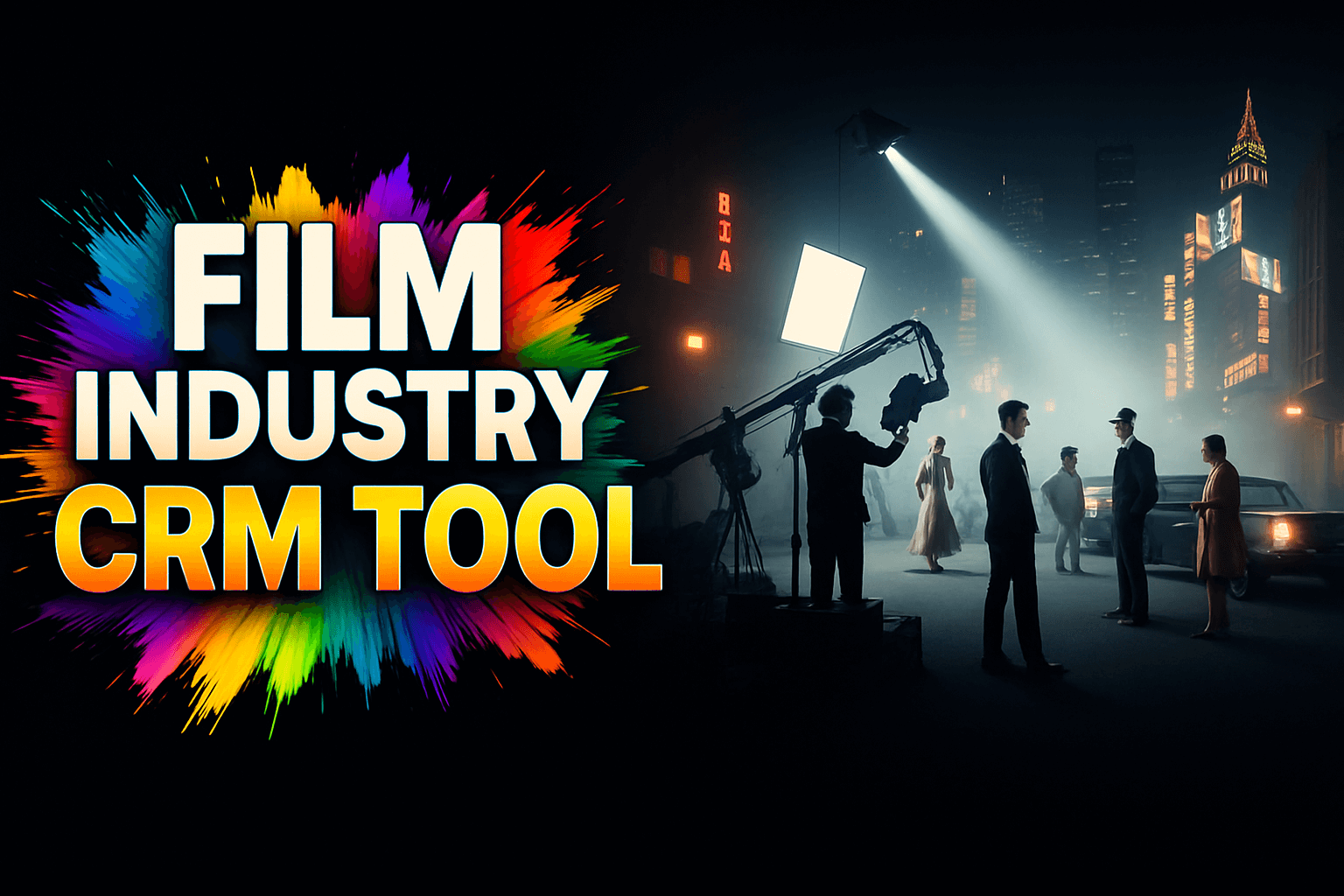Film Industry CRM Tool: The Guide for M&E Executives

Introduction
As an executive in the Media & Entertainment (M&E) industry, you operate in a landscape defined by perpetual motion. New projects emerge, co-production deals are struck, and key decision-makers change roles with dizzying speed.
In this high-stakes environment, where every new film or TV series represents a potential revenue stream, the traditional approach of managing contacts and leads through spreadsheets or generic software has become a liability.
The challenge isn’t just a lack of information; it’s the fragmentation of that information. In my analysis, a comprehensive solution is required—one that moves beyond simple customer relationship management to provide genuine, actionable market intelligence. This is the concept behind a purpose-built film industry CRM tool.
Table of content
- The Problem with a Generic Film Industry CRM Tool
- Beyond Contact Management: What a True Film Industry CRM Tool Should Do
- The Strategic Advantage of a Specialized Film Industry CRM Tool
- How to Choose the Right Film Industry CRM Tool for Your Business
- How Vitrina Helps: A Unified Approach to Deal-Making
- Conclusion: Future-Proofing Your Business with a Film Industry CRM Tool
- Frequently Asked Questions
Key Takeaways
| Core Challenge | Generic CRMs fail M&E executives by lacking project-specific, real-time data and a global view of the industry. |
| Strategic Solution | A specialized film industry CRM tool integrates contact management with deep project and company intelligence to unlock new business opportunities. |
| Executive Insight | Success in the M&E supply chain hinges on moving from reactive deal-making to proactive, data-driven collaboration. |
The Problem with a Generic Film Industry CRM Tool
When I speak with senior M&E professionals—from content acquisition executives to heads of production—a common theme emerges: the struggle to adapt off-the-shelf CRM solutions.
A standard CRM, such as those from market leaders like Salesforce or Microsoft, is designed to manage customer interactions and sales pipelines in a traditional, linear fashion. For a retail business or an IT company, this model works. For the M&E supply chain, it falls short.
The core issue is that a generic CRM is fundamentally a contact and transaction tracker. It’s built to log a call, schedule a meeting, and track a deal’s progression from “lead” to “closed.” But in the film and TV industry, a deal is rarely that simple.
It’s not just about a person at a company; it’s about a person at a company working on a specific film or TV project, often in a co-production with a dozen other entities, all while new projects are constantly entering development and production. The real value is in understanding this complex, interconnected ecosystem—data that a generic film industry CRM tool simply does not capture.
According to a 2024 report by EY and FICCI, the Indian M&E sector grew to INR 2.5 trillion (US$29.4 billion), driven largely by digital media and advertising. This growth highlights the immense opportunity but also the complexity of a global market where business is no longer confined to a few major studios.
You need to identify emerging players, understand their slates, and connect with the right people at the right time. Manual research to piece this together is not only inefficient but also impossible to scale. This fragmented approach leads to missed opportunities, wasted time, and a significant lack of market visibility.
Beyond Contact Management: What a True Film Industry CRM Tool Should Do
An effective film industry CRM tool must be a purpose-built system of record for the entire M&E supply chain. Its value lies not just in who you know, but in what they are working on, who they are collaborating with, and where they are in the project lifecycle. In my analysis, a true M&E CRM should be defined by its ability to answer these critical questions:
- Project Tracking & Early Warning: Does the tool provide real-time updates on film and TV projects from development through production and post? For instance, knowing a project has entered production in Hungary or a new co-production partner has joined a series in Spain provides a crucial advantage. A specialized film industry CRM tool must track these projects with granular detail, including key creative and financial personnel.
- Company Profiling & Discovery: Can you go beyond a simple company name to understand its full profile? This includes its production slate, its deal history, and its key collaborators. A robust film industry CRM tool should allow you to search for companies by genre, location, or past projects, providing a comprehensive, data-rich profile.
- Executive & Departmental Search: The decision-makers in this industry are fluid. A tool that only tracks job titles is of limited use. The right solution should allow you to search for executives by the projects they’ve worked on or the specific roles they hold, such as “Head of Acquisitions” or “VP of Development.”
The Strategic Advantage of a Specialized Film Industry CRM Tool
The M&E landscape is in a state of flux. While some reports from sources like ProdPro suggest that global production activity in Q2 2024 was up by 22% compared to the same period in 2023 (a period heavily impacted by strikes), overall volumes remain lower than in 2022.
This signals a new era of strategic caution, where every deal must be more carefully vetted. In this environment, a specialized film industry CRM tool is not a luxury—it’s a necessity.
The strategic advantage is multifaceted:
- Accelerated Deal Flow: By centralizing project intelligence and contact data, you drastically reduce the time spent on manual research. This means your team can move from discovery to outreach much faster, giving you a competitive edge.
- Reduced Risk: A purpose-built tool provides data on a company’s past projects, collaborators, and track record. This level of insight allows you to vet potential partners and co-producers more effectively, mitigating the risk of entering into a bad deal.
- Smarter Pipeline Building: Instead of a generic list of leads, you can build a pipeline based on real, live projects. You can track a project from its earliest stages, allowing you to engage with the right people at the optimal time—whether that’s a co-production financing deal in development or a distribution agreement in post-production.
A specialized film industry CRM tool provides a holistic view of the global entertainment supply chain, something no general-purpose CRM can replicate.
It’s designed to manage the unique data points that matter most: not just a customer’s name, but a production company’s entire slate, a producer’s verified credits, and a project’s real-time production status. This is the difference between simply managing relationships and actively shaping a strategic business pipeline.
How to Choose the Right Film Industry CRM Tool for Your Business
Selecting the right solution is a strategic decision that requires a clear-eyed assessment of your needs. In my experience, executives should prioritize three key criteria:
- Data Integrity & Depth: The tool is only as good as the data it contains. Does it source information from thousands of official, verified sources? Does it update daily? A generic system filled with outdated or incomplete contact information is a liability. You need a platform that provides validated data on projects, companies, and executives.
- Industry Specialization: A platform built for the M&E industry will understand the nuances of a film’s lifecycle. Does it track projects by stage (e.g., development, production, post) and tag them with industry-specific metadata like genre, language, and key personnel? Can it identify who is financing a project or handling its international distribution? Generic CRMs cannot provide this level of specificity.
- Seamless Integration: Can the platform integrate with your existing workflow? Ideally, a specialized tool should work with your existing CRM to enrich it with industry-specific data. This prevents the need for a total operational overhaul and allows you to leverage your existing infrastructure while adding a powerful new layer of intelligence.
How Vitrina Helps: A Unified Approach to Deal-Making
Vitrina is a system built specifically to address the core challenges of the entertainment supply chain. It’s not a generic CRM adapted for the industry; it is a native, intelligence-driven platform designed to serve as a film industry CRM tool at an executive level.
Our platform provides a single source of truth for all business development and deal-making activities, offering a level of visibility that spreadsheets and generic software can never achieve. Vitrina’s core capabilities include:
- Global Project Tracking: With daily updates from over 2,500 data sources, Vitrina’s Film+TV Projects Tracker provides real-time alerts on projects across the globe. You can search by genre, stage, territory, or key personnel to identify leads at the earliest possible stage.
- Comprehensive Company & Executive Profiling: The platform offers profiles on over 350,000 companies and 3 million individuals, with verified credits and contact details. This allows for unparalleled precision in finding co-production partners, distributors, or key collaborators.
- API & CRM Integration: Vitrina is designed to enrich your existing CRM infrastructure (e.g., HubSpot, Salesforce). This means you can integrate our deep, industry-specific intelligence directly into your current workflows, transforming a standard CRM into a powerful, specialized film industry CRM tool.
By providing a unified view of the market, Vitrina allows executives to move from reactive deal-making to a proactive, strategic approach.
It eliminates the fragmentation of data, reduces the time spent on manual research, and empowers teams to make faster, more confident decisions. The result is a more efficient, intelligent, and scalable business development pipeline.
Conclusion: Future-Proofing Your Business with a Film Industry CRM Tool
The media and entertainment industry will continue to evolve at an unprecedented pace. The need for a film industry CRM tool that can keep up with this change is no longer a strategic option—it’s a critical imperative.
An off-the-shelf solution will not suffice in an industry where the value is in the interconnected web of projects, companies, and people. My analysis shows that the most successful executives are those who invest in specialized intelligence platforms that provide a unified, global view of the market.
They are moving beyond simple contact management to embrace a data-driven approach that future-proofs their business.
The time to consolidate your data and streamline your deal flow is now.Sign-up Today
Frequently Asked Questions
The primary difference is data specialization. A generic CRM focuses on general sales and customer data. A specialized film industry CRM tool integrates and tracks unique industry data points, such as film and TV projects, company credits, and verified executive contact information.
Yes. A specialized tool allows you to search for and identify potential co-production partners and financiers based on their past project history, genre expertise, and regional focus. This streamlines the process of finding aligned partners and building a targeted outreach pipeline.
No. While large studios and streamers use these tools for market intelligence, they are also invaluable for independent production companies, vendors, and financiers. The data and insights provided are essential for any business operating within the M&E supply chain, regardless of size.
A purpose-built tool allows you to build a pipeline based on real projects in the market, not just a list of names. It provides early-warning intelligence on projects entering development, allowing your team to engage with the right people at the most opportune time, before a deal is finalized.

























